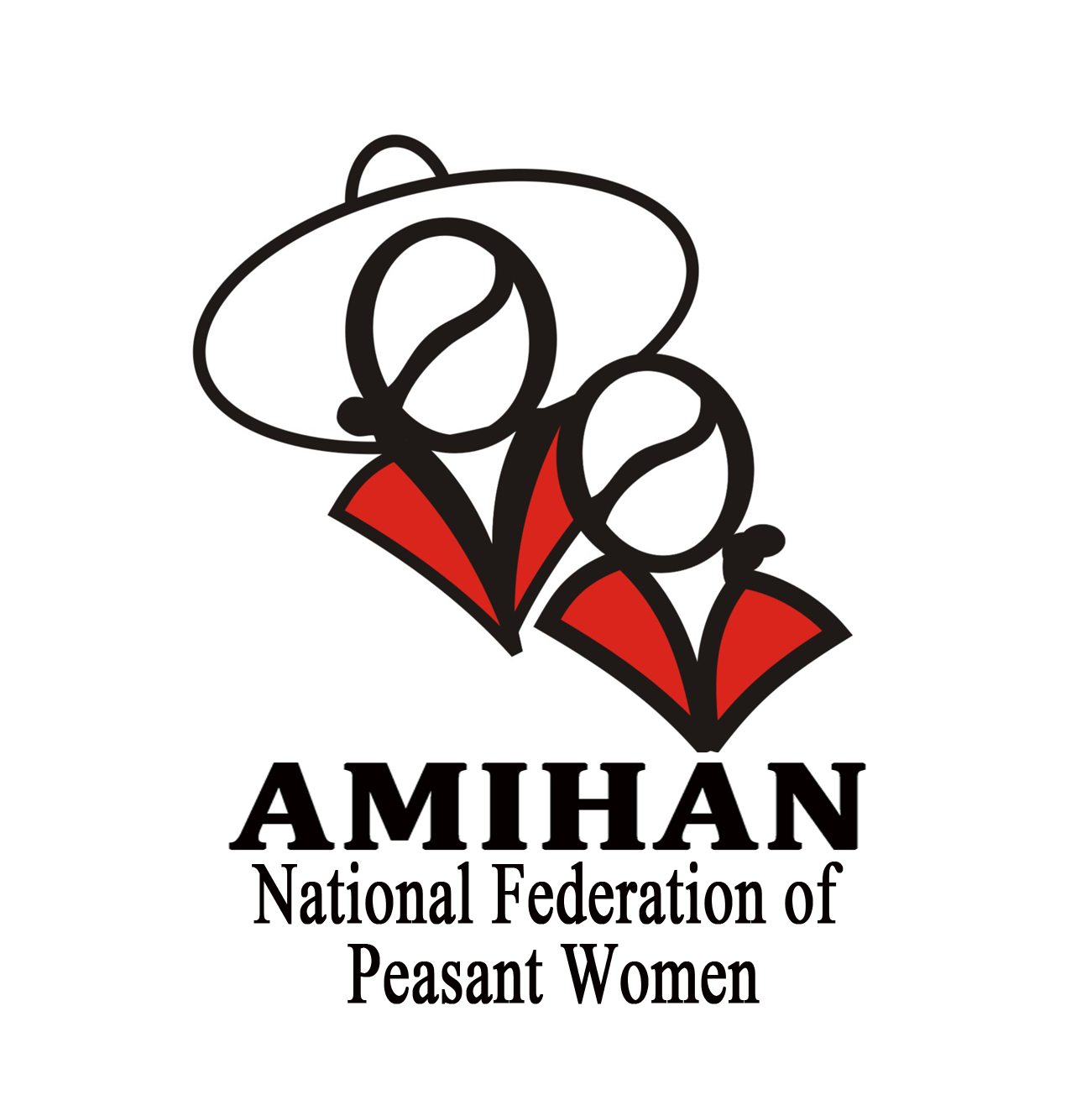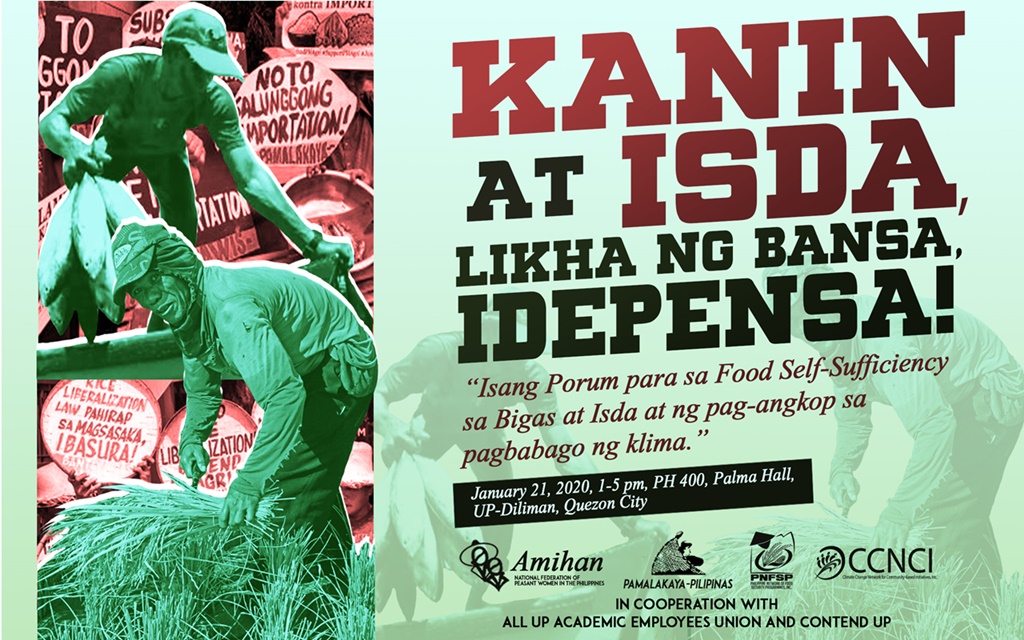Campaign Advocacy Program for Food Self-Sufficiency on Rice and Fish
and Against Detrimental Impacts of Climate Change
RATIONALE
The Philippines which is traditionally known in the world as an agricultural country is facing a peculiar transformation from a being a food self-sufficient society into an import-dependent one. Staple food includes rice and fish, but producers and consumers are hounded by crises at the sphere of production and circulation.
The year 2019 was historical as the Philippine government enacted the Republic Act 11203 or Rice Liberalization Law, which has lifted the quantitative restriction on rice importation and decoupled the government regulatory agency, National Food Authority (NFA). As brief consequence, volume of imported rice is expected to reach 3 million metric tons, beating China’s 2.5 million metric tons, while farm gate prices were depressed reaching to as low as P7 per kilo, throwing many rice farmers into bankruptcy and indebtedness. Moreover, the government ordered the importation of near three-fold the volume of the previous year at 45,000 metric tons of round scad or galunggong, which was based on its self-made crisis of price shocks and its own fishing ban orders in Palawan and Zamboanga. Likewise, farm gate prices of galunggong fell to P40 to P60 per kilo, as retail prices spiked to more than P300 per kilo. Galunggong is considered as staple fish and its retail prices or affordability were used as basis on the state of the fisheries sector and the economy.
Meanwhile, government non-intervention in galunggong fishing or non-support to small fishermen or lack thereof, have been manifested in the past years. Since 2016, national galunggong production declined by an average of 9%, which was at 171,000 metric tons in 2018. Majority of the galunggong regions and provinces have been declining on their catch, including Calabarzon, Eastern Visayas, Bicol, Central Visayas, Ilocos, Mimaropa including Palawan and Mindoro provinces, Cagayan Valley, Western Visayas, Soccsksargen and the National Capital Region. Even the Autonomous Region of Muslim Mindanao (ARMM), which tops galunggong production in the country, averaged a decline. However, the fisherfolk movement in the country primarily attributed the decline to the liberalization policies as provisioned by the Republic Act 8550 Fisheries Code of 1998 and its amendments RA 10654 on Illegal, Unreported and Unregulated Fishing (IUUF), as they promote aquaculture, that already surpassed the share of contribution of open-sea fishing to the country’s total production.
In 2016 to present, with the continued implementation of liberalization policies and intensification via the RA 11203 and fish importation orders, food self-sufficiency on rice and galunggong has been damaged further and import-dependency increases. Import dependency ratio or the opposite of the self-sufficiency ratio on rice increased by 177%, from 5% to 14% or more than 2 million metric tons, while on galunggong by eight-fold from 0.4% to 3% or more than 5,400 metric tons.
On top of the detrimental impact of liberalization policies on rice and fishery sector and the more strategic neglect of the agricultural sector, the countryside has far more become vulnerable to climate change, particularly to typhoons and its associated flooding and storm surges, extreme drought, and even rising sea levels. It should be put to attention that damages to agriculture of strong typhoons such as Pablo in 2012, and Yolanda in 2013, reached to P26.5 billion and P24.4 billion, respectively, but the government was obviously unable to compensate on these damages in light of alleviating the rural-based sectors from the losses of their livelihood. Then at the ultimate opposite, farmers had recently face the onslaught of extreme drought and el niňo phenomenon, that caused damages to agriculture at near P8 billion in April 2019.
The farming sector identified as one of the encumbering factor is the lack or absence of infrastructure and post-harvest facilities for agricultural production, particularly, the low and slow irrigation development in the country, reliance for rain water, and absence of drying facilities and warehouses. Irrigation development in 2018 only covered 1.9 million hectares or at 61% of the total irrigable area of 3.1 million. This was an 11% increase from the 50% irrigation development in 2011. Moreover, government intervention could also be describe by the minority share of the national irrigation system which covers less than half of the service area. Full irrigation development and a three-cropping year for the rice granary regions Central Luzon and Cagayan Valley is estimated to yield more than 14 million metric tons, already three-fourth of the 2018 palay production, and more than half of the country’s national utilization at 16.7 million metric tons of milled rice. Thus, full capacity production enabled by irrigation development is expected to improve the livelihood of farmers, alleviating their vulnerabilities to climate change; and sustain self-sufficiency and self-reliance for national food requirements.
Moreover, the fisherfolk sector has raised that the continuing privatization and conversion of bay areas, predominantly by reclamation projects, is threatening to displaced traditional fishing communities; undermine the steady supply of fish products in the economy; and a major risk of marine environmental degradation and calamity such as flooding and subsidence of land areas. Proposed reclamation projects in Manila Bay such as the San Miguel Corporation’s Aerotropolis Project, Bacoor Reclamation Project, the POGO and Sangley Airport, and the Manila Bay Coastal Expressway Project, are estimated to displace tens of thousands of fisherfolk families in the provinces of Bulacan, Cavite and Bataan, and even in Manila and Navotas City. The Bulacan province already posted an annual decline of 3% on its municipal fishing production, while tourism zones or where privatization and conversion of bay areas are on its height and reclamation projects are planned, Batangas and Palawan declined by an annual average of 5%. The Panay island provinces also declined in municipal fisheries production at lowest at 14%. Various reclamation projects are planned in the island, including the 1,200-hectare Leganes reclamation in Iloilo. In Davao City where an industrial park reclamation project is planned, municipal fishing production is apparently being wiped out with an annual decline of 28%.
As there are many factors badgering the country’s rice and fisheries sector, it could be pinpointed that liberalization policies, and man-made ventures such as reclamation projects, comprehensively impact the producer and consumer sectors, the marine and natural environment and increase the vulnerability of poor sectors to climate change. It is of utmost significance to address these areas of concerns to stimulate fundamental reforms, but would require sustained public information campaigns and people’s mobilization.
PROGRAM GOALS
- To put at national attention the areas of concerns and predicaments of involved marginalized and vulnerable sectors, to effect the appropriate initiative for policy reforms;
- To educate the broadest sector of the major points relating to the detrimental impacts of liberalization policies and reclamation projects to the rice and fishery sector, which is expected to set off the people’s mobilization for the aimed policy reforms;
- To build a sustained support system for the localized people’s campaigns being carried out by people’s organizations.
- The Amihan or the National Federation of Peasant Women, representing the rice farmers, peasant women and consumers, as secretariat of the Bantay Bigas rice watchdog group.
- The Pambansang Lakas ng Kilusang Mamamalakaya ng Pilipinas (National Federation of Small Fisherfolk Organizations in the Philippines), representing the small fisherfolk.
- The Philippine Network of Food Security Programmes, Inc. (PNFSP), as advocates of national food security based on self-sufficiency and self-reliance.
- Climate Change Network for Community-Based Initiatives (CCNCI), as national alliance addressing the vulnerabilities of poor sectors to climate change.
NATURE OF THE PROGRAM
The “Kanin at Isdang Likha ng Bansa, Idepensa” (Defend Locally-Produced Rice and Fish): Campaign Advocacy Program for Food Self-Sufficiency on Rice and Fish and Against Detrimental Impacts of Climate Change, is a public education and people’s mobilization campaign, to be carried out by people’s organizations that legitimately represent the concerned sectors.
PROPOSED PROGRAM ACTIVITIES
- January 12, 2020, Bacoor City, Cavite, Petition Signing for the Repeal of the Republic Act 11203 Rice Liberalization Law led by Amihan, Bantay Bigas and Pamalakaya.
- January 17, 2020, in front of the central office of the Department of Environment and Natural Resources in Quezon City, “Black Friday Protest” Against Reclamation Projects led by Pamalakaya.
- January 21, 2020, Forum, “Kanin at Isdang Likha ng Bansa, Idepensa,”, 1-5pm, UP Diliman, led by Amihan, Pamalakaya, PNFSP and CCNCI.
- February 10, 2020, “Human Chain vs. RA 11203 Rice Liberalization Law”, schools and universities, build up activity for February 14 (first year implementation of RA 11203) led by Amihan and Bantay Bigas.
- February 12, 2020, “Social Media Rally,” #RiseforRice #RepealRA11203, led by Amihan and Bantay Bigas.
- February 14, 2020, Quezon City Memorial Circle, “Rise for Rice” Participation in the One Billion Rising Activity led by Amihan.
- February 14, 2020, 10:30 am, Mendiola Bridge, Manila, “Rise for Rice” Mobilization for the Repeal of the RA 11203 Rice Liberalization Law (coinciding its first year of implementation) led by Amihan and Bantay Bigas.
- February 24, 2020, Mendiola Bridge, Manila, Fisherfolk Mobilization for the Repeal of the Republic Act 8850 Fisheries Code of 1998 (coinciding its anniversary of enactment).
- March 5, 2020, Farmers’ Protest vs. RA 11203 Rice Liberalization Law, (coinciding with the harvest season), in front of Department of Agriculture, led by Amihan and Bantay Bigas.
CONTACT DETAILS
- Amihan
- Pamalakaya
- PNFSP
- CCNCI

